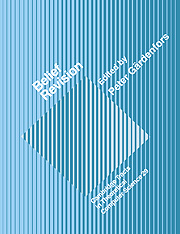Book contents
- Frontmatter
- Contents
- Belief revision: An introduction
- Reason maintenance and belief revision: Foundations versus coherence theories
- Syntax based approaches to belief revision
- A dyadic representation of belief
- On the logic of theory change: More maps between different kinds of contraction functions
- Belief change and possibility theory
- On the difference between updating a knowledge base and revising it
- Planning from first principles
- Autonomous belief revision and communication
- Conditionals and knowledge-base update
- Index
Planning from first principles
Published online by Cambridge University Press: 21 September 2009
- Frontmatter
- Contents
- Belief revision: An introduction
- Reason maintenance and belief revision: Foundations versus coherence theories
- Syntax based approaches to belief revision
- A dyadic representation of belief
- On the logic of theory change: More maps between different kinds of contraction functions
- Belief change and possibility theory
- On the difference between updating a knowledge base and revising it
- Planning from first principles
- Autonomous belief revision and communication
- Conditionals and knowledge-base update
- Index
Summary
INTRODUCTION
Since the beginning of artificial intelligence research on action, researchers have been concerned with reasoning about actions with preconditions and postconditions. Through the work of Moore (1980), Pratt's (1980) dynamic semantics soon established itself in artificial intelligence as the appropriate semantics for action. Mysteriously, however, actions with preconditions and postconditions were not given a proper treatment within the modal framework of dynamic logic. This paper offers such an analysis. Things are complicated by the need to deal at the same time with the notion of competence, or an actor's ability. Below, a logic of actions with preconditions and postconditions is given a sound and complete syntactic characterization, in a logical formalism in which it is possible to express actor competence, and the utility of this formalism is demonstrated in the generation and evaluation of plans.
The notion of actions with pre- and postconditions arose in artificial intelligence in the field of planning. In formulating a plan to reach some particular goal, there are a number of things which a planning agent must take into account. First, he will have to decide which actions can and may be undertaken in order to reach the goal. The physical, legal, financial and other constraints under which an actor must act will be lumped together below, since we will be interested in what is common to them all, namely that they restrict available options.
- Type
- Chapter
- Information
- Belief Revision , pp. 204 - 219Publisher: Cambridge University PressPrint publication year: 1992
- 2
- Cited by



